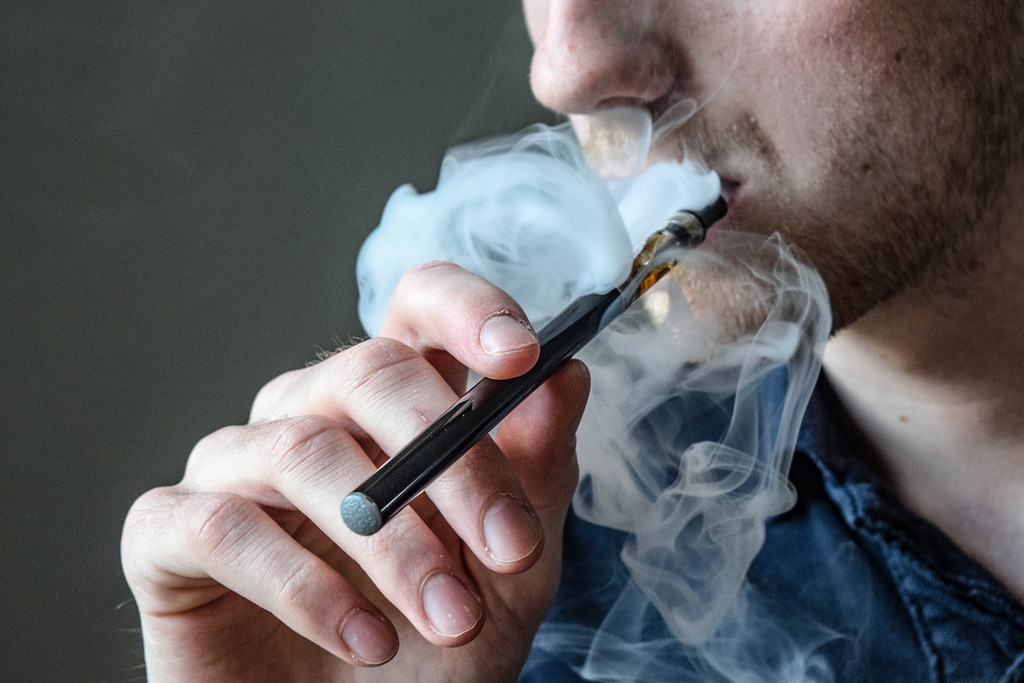School district addresses rise in youth vaping
Incident at South Side Middle School sparks need for awareness
Rockville Centre students, some as young as middle schoolers, are experimenting with electronic cigarette use, or vaping, and the district wants to stay ahead of the national trend by educating students about this harmful habit.
“We being school administrators islandwide, certainly statewide and nationwide, are becoming very, very concerned about the rampant use,” said Dr. Noreen Leahy, assistant superintendent for pupil personnel services and special education, who also oversees the school district’s drug, alcohol and violence prevention task force. “It seems almost that it’s become a fad that is a very, very dangerous one.”
Leahy added that although vaping is not yet a widespread problem in the district, she was uncertain specifically how common the use of e-cigarettes is in Rockville Centre.
“I do know one thing,” she said. “We’re not going to wait around to find out.”
Students were caught vaping at South Side Middle School after hours earlier this month, according to Principal Shelagh McGinn, in what she called an isolated incident that was dealt with internally.
Electronic cigarettes were invented in China in 2003, and hit the market the following year. Users inhale an aerosol created by an internal battery that heats up liquid that usually contains nicotine, flavorings and other additives. The devices have many nicknames — e-cigs, cigalikes, e-hookahs, mods, vape pens, vapes and tank systems.
Used globally, their prevalence, especially among teenagers, has grown considerably. In 2015, more than a quarter of students across the country in grades six to 12, and more than a third of young adults, had tried e-cigarettes, according to the surgeon general.
Vaping among high school students in New York state doubled between 2014 and 2016, and far exceeds the rate of cigarette smoking, according to the state’s Department of Health. Earlier this month, U.S. Sen. Chuck Schumer called on the Federal Drug Administration to reverse a recent decision to delay the regulation of e-cigarettes.
“What they’re finding is these kids think that it’s not dangerous because it’s flavored like cherry and cotton candy and strawberry and everything like that,” said Ruthanne McCormack, project coordinator for the Rockville Centre Coalition for Youth.
In reality, e-cigarettes are considered tobacco products, because most contain nicotine. Many also contain harmful ingredients such as diacetyl, linked to lung disease, “volatile organic compounds” and heavy metals such as nickel, tin and lead, the surgeon general’s office states on its website.
According to a letter that Leahy sent to Rockville Centre’s Parent Teacher Association and district personnel, vaping devices are compatible with marijuana, cocaine, liquid THC and other drugs, making substance abuse easier and less publicly recognizable for teens and young adults.
E-cigarettes have a diverse and nonstandard nomenclature for the devices, according to the surgeon general. One product, JUULs, described in Leahy’s letter, resemble flash drives and create less smoke and scent, allowing them to be kept hidden. They “are arguably more addictive, as one pod is the equivalent of 20 cigarettes (or a typical pack of smokes), while JUUL users skip the visualization and process of blowing through a pack,” the letter states.
Though you must be 18 to buy e-cigarettes, some younger students are getting them from older friends and siblings, McCormack said, or buying them online.
“I cannot emphasize enough our concern,” Leahy’s letter states. “Talk to your children and keep your eyes open. We’ll do the same.”
David Fasolino, 18, a senior at South Side High School, said that although he does not see students vaping in school, it has become more visible on social media. He added that Principal John Murphy made an announcement last week that students caught with e-cigarettes would be “severely disciplined.”
Fasolino, co-chairman of social media and marketing for the Rockville Centre Youth Council, said he joined the group as a freshman, and now promotes drug-free events to help curb substance use.
“We’re too young to be doing this stuff,” he said. “We need to be setting an example as future leaders. We can’t be doing this stuff because it will only lead to future problems in our lives.”
Murphy said that penalties for possessing or using e-cigarettes on school grounds will be significant, noting, however, that the high school has not yet faced this problem. He added that he and McGinn would send out a letter to parents this week to remind them that the district has a zero-tolerance policy for these devices. “We’re in the preventative, proactive stage,” he said.
McCormack said that the Rockville Centre Coalition for Youth and the district have been in contact with Northwell Health, which has a smoking cessation program, to coordinate a presentation for students and parents.
“Drug use, substance us, we’ve come down hard on those in the past,” Leahy asserted. “E-cigarettes and vaping are no different.”
Photo: Courtesy vaping360.com.






